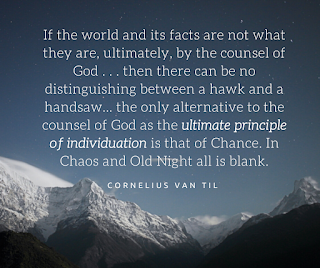God and the Problem of Individuation

The transcendental argument for Christian theism, as conceived by Cornelius Van Til, aims to demonstrate the necessity of the Christian worldview for any intelligible experience. One of the most fundamental elements of this transcendental program is the philosophical problem of the One and the Many. Apart from being a potent philosophical argument for Christianity, the One and Many problem is a useful conceptual tool for analyzing and spelling out the areas in which unbelieving philosophical systems fail. That is, a lot of the philosophical problems that plague the non-Christian worldview can be characterized, in one way or another, as instances of the One and Many problem. A survey of the relevant literature surrounding the defense of the transcendental argument for Christian theism would reveal a tendency for Van Tilians to undermine unbelieving worldviews by pressing problems relating to the lack of order and unity in the objects of knowledge. Arguments that appeal to the problem
